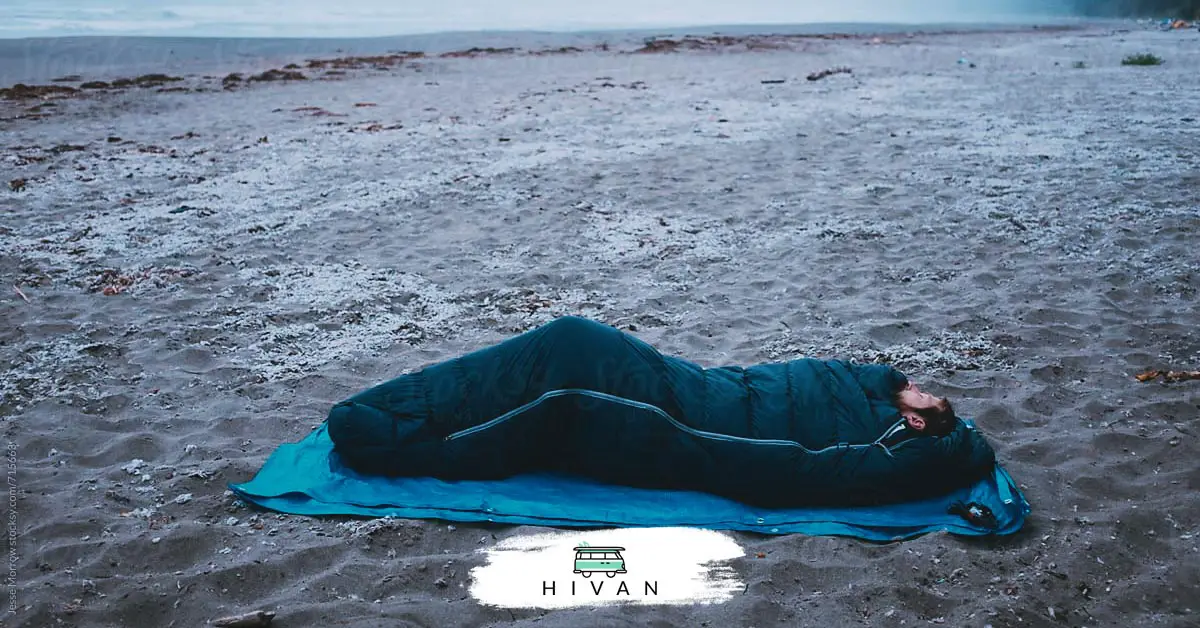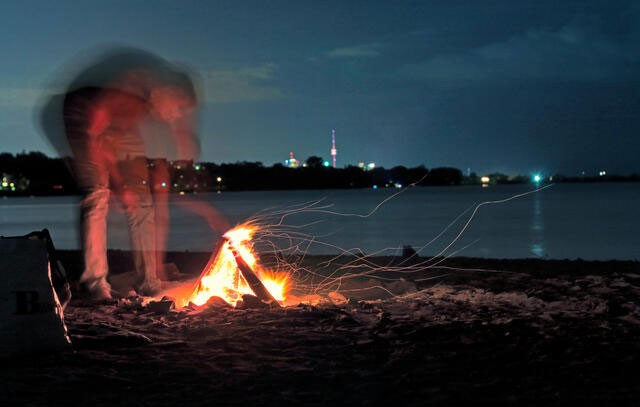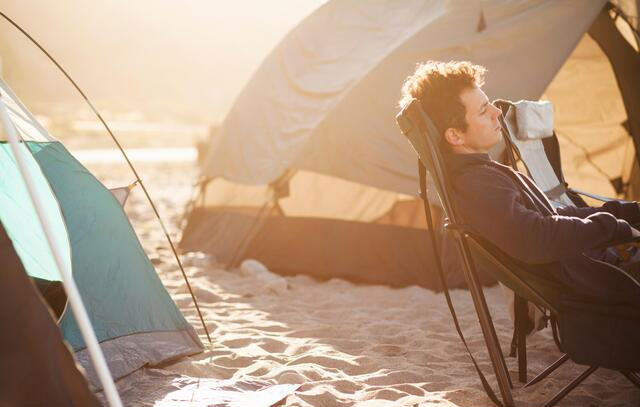Hi-van is supported by its audience. When you purchase using our links, we may earn an affiliate commission (no added cost to you). Learn more
Sleeping on the beach can be an incredible experience that many people dream of. Imagine falling asleep to the calming sound of waves crashing against the shore, feeling the cool ocean breeze on your skin, and waking up to the sight of a beautiful sunrise.
However, before you pack your bags and head to the nearest shoreline, there are some essential things to consider.
While the idea of sleeping under the stars with your toes in the sand might seem idyllic, it’s crucial to be aware of the local beach rules, as some destinations prohibit overnight stays.
Also, consider safety and comfort factors, such as tides, weather conditions, and the importance of choosing a suitable sleeping spot to protect yourself from the elements.
Keep reading to learn how you can enjoy a safe and comfortable rest on the beach, from choosing the right spot and gear to protecting yourself from sunburn, insects, and other hazards.

Potential Risks and Safety Concerns
Weather Elements
When planning to sleep on the beach, you must consider the potential risks posed by various weather elements. Exposure to extreme temperatures, such as intense heat during the day or cold at night, can cause dehydration or hypothermia. To protect yourself, seek shade during the warmest hours, wear sunscreen, and bring layers of clothing for nighttime. Additionally, storms can appear unexpectedly and pose dangers with strong winds, rain, and lightning. Always check the weather forecast and have a backup plan, such as nearby hotels, in case of emergencies.
Wild Animals
Be aware of the potential for encountering wild animals on the beach. Research the area beforehand to determine if certain animals, such as raccoons, birds, or even snakes, are common. Avoid leaving food unattended, as this can attract unwanted visitors. In cases of aggressive behavior, maintain a safe distance and notify the appropriate authorities or lifeguards.
Rising Tides
Rising tides can pose significant dangers while sleeping on the beach. To prevent being caught off-guard, check the tide schedule and set up a comfortable distance from the water’s edge. Be aware that high tides can quickly turn safe areas into hazardous zones, especially during storm surges. Additionally, keep in mind that conditions can change rapidly, so always be prepared to relocate.
Being Attacked or Robbed
Unfortunately, sleeping on the beach leaves you vulnerable to potential attacks or robberies. To reduce the risk, choose a well-lit, populated area near installed security measures, like cameras or patrolled beaches. Keep your valuables secured and hidden from sight. If possible, sleep with a friend or in a group as an extra precaution.
By understanding and addressing these risks and safety concerns, you can better ensure a safe and enjoyable experience while sleeping on the beach.
Legal Aspects and Guidelines

Local Regulations
When considering sleeping on the beach, it’s essential to understand the local guidelines and regulations that govern beach use. Laws and restrictions vary across states and municipalities, which means not all beaches in the USA have the same rules. To avoid legal issues, always research the specific beach you plan to visit before going.
In some locations, it’s illegal to sleep on the beach due to concerns regarding waste management and safety. As a result, you may face a third-degree misdemeanor punishable by a $500 fine and up to 60 days in jail if you violate the regulations. Be sure to check the local ordinances and consult with authorities to stay on the right side of the law.
Another factor to consider is the potential for dangerous weather conditions, such as thunderstorms. Beaches can be hazardous during storms, leading to the closure of certain areas for public safety. Stay informed about the weather and heed any warnings issued by local authorities.
Camping Permits
In some cases, you may be allowed to sleep on the beach if you acquire a camping permit. These permits grant you permission to camp overnight in designated areas and are often required by law to control the number of campers and maintain the beach’s cleanliness.
For example, applying for a camping permit in California State Parks is required when you wish to spend the night on specific beaches. This ensures you follow the guidelines and avoid penalties from improper camping. Remember that not all beaches offer permits, and some beaches prohibit overnight stays entirely.
Obtaining a camping permit usually involves a fee, and they may be limited in number, so it’s essential to secure your permit well in advance of your planned beach stay. Contact the local authorities or visit their websites to learn more about the permits’ availability and requirements.
While following these guidelines allows you to enjoy a night on the beach legally and safely, always remember to respect the environment by picking up your waste, observing any designated quiet hours, and following all posted rules and regulations.
How To Find Out if Sleeping on the Beach Is Allowed

Most beaches have very clear signage letting you know whether or not you’re allowed to camp there. Look in the parking lot and entrance of the beach for information regarding hours.
To better understand the rules of the beach you’re at, look for signs with messages such as:
No motor vehicles allowed in the parking lot between 12 AM and 5 AM
- Beach/park hours 7 AM to 8 PM
- Private property
- No trespassing
- No camping
- Camping prohibited
- No camping or overnight parking
- Beach closed
If you know ahead of time which beach you’d like to camp at, looking online is always a good way of familiarizing yourself with its rules.
Most beaches are publicly owned land and will have a page on a government park’s website that lays out specific rules and regulations.

Beaches Where Camping Is Legal
While it is best practice to assume that you can’t just park and camp at any beach you may find, don’t lose heart; there are absolutely beaches that you’re allowed to stay at overnight.
Many national and state parks allow camping on beaches in designated areas.
Typically, you will need a reservation for this type of activity, which can be easily made by calling the relevant parks department or logging on to their website.
Keep in mind that tent camping and RV/van camping often require different permits and have different camping spaces available, so make sure to be specific when making your reservation.
Ways To Find Beaches That You Are Legally Allowed To Camp On
While it can be frustrating to search around for a beach that does allow overnight camping, the likelihood is that if you’re on the coast, you’re probably within a few hours of one.
National and state parks are a great option for legal beach camping. Depending on where you are, there may also be county parks that allow sleeping on the beach.
Here a nice video by Mike where he shares his experience camping on a beach in Philippines:
National Parks
National parks offer a lot when it comes to camping. Designed to fit travelers on a budget, national parks are a great option for solo, couple, or family getaways.
The National Parks Service has extensive information on camping options for each park on its website.
Most parks require permits for staying overnight and offer both tent and van/RV camping. Ticket prices typically cost between $20-$50/night, but prices vary based on site type, season, location, and more.
Parks such as Olympics National Park and Channel Islands National Park both offer camping on certain beaches within the parks.
Related Article: Can You Bring Firewood Into a State Park?
State Parks
State parks are another great option for sleeping on the beach.
While many beaches in state parks don’t allow camping, there is usually ample information available for what is and is not allowed.
Sonoma Coast State Park in California, for example, offers both tent and RV camping at multiple beaches in the park, while Anclote Key Preserve State Park in Florida allows tent camping on certain parts of the beach for free.
It is best to do research before you arrive, so you’re not scrambling to find somewhere to sleep in the middle of the night. Check city, state, and national park websites to see if there is any camping allowed at your destination.
Whenever possible, making a reservation ahead of time is recommended, especially during the busy summer months. Always double-check the rules and requirements when booking, so you’re sure it will work for you.
Precautions and Preparation

Before deciding to sleep on the beach, it’s essential to take certain precautions and prepare adequately to ensure your safety and comfort. In this section, we’ll discuss informing friends and authorities, as well as suitable gear and accommodations for your beach camping experience.
Informing Friends and Authorities
Before embarking on your beach trip, let your friends and family members know about your plans and provide them with an estimated time you’ll be back. This will ensure that someone is aware of your location and can alert the authorities if you don’t check in according to the agreed-upon timeframe.
In addition to informing your close ones, it’s important to notify the local authorities, especially if you’re unsure about the legality of sleeping on the beach in your chosen area. Some beaches prohibit overnight stays, so checking with the police or local authorities can help you avoid fines or other legal issues. Also, the authorities can provide information about known safety concerns or potential hazards in the area.
Suitable Gear and Accommodations
When planning your beach camping experience, pack suitable gear for your comfort and protection from the elements. Here are some recommendations to consider:
- Sleeping arrangements: Depending on your preference, you can choose between a tent, hammock, or sleeping bag. Pick the option that offers the most comfort and is designed to handle the specific beach environment you’ll be staying in.
- Weather considerations: Before your trip, check the weather forecast and bring appropriate gear in case of unfavorable conditions, such as rain, wind, or cold temperatures. A rain cover, warm clothes, and windbreaker can be helpful during unexpected weather changes.
- Safety gear: In addition to suitable sleeping accommodations, ensure you have access to a first aid kit and basic safety tools such as a flashlight, whistle, and pocket knife.
- Environmental responsibility: Finally, it’s crucial to minimize your impact on the beach environment. Bring trash bags to collect and dispose of your waste, and avoid bringing any unnecessary items that could harm the ecosystem, such as single-use plastics or non-biodegradable materials.
By taking these steps, you can increase your overall safety and comfort while enjoying a night under the stars on the beach.
Advantages of Sleeping on the Beach

Improved Sleep
When you sleep on the beach, your body’s stress and anxiety levels can significantly decrease, helping you fall asleep more easily and enjoy a restful night’s sleep. The gentle sound of waves crashing and the fresh ocean breeze both contribute to a calming atmosphere that can enhance sleep quality1. In addition, walking on the sand can give your body some much-needed physical fatigue, which further promotes better sleep2.
Improved Health
Sleeping on the beach can deliver multiple health benefits beyond just improved sleep. Spending time on the beach can help lower your blood pressure and stress hormone levels, making it an ideal environment for relaxation3. The proximity to nature and the soothing sounds of the ocean serve to reduce anxiety and nervous system arousal, which in turn supports mental well-being4.
Take advantage of the peaceful environment the beach provides by engaging in mindfulness practices like meditation or deep breathing exercises, further enhancing your overall health and well-being.
There are a ton of youtube videos with beach sounds that could also do the job.
Footnotes
- Slumber and Smile – Why Do I Sleep Better at the Beach?
- The Fact Site – 10 Health Benefits of Hitting the Beach
- WebMD – Mental Health Benefits of the Beach
- Redbook – 10 Surprising Health Benefits Of Going To The Beach
Frequently Asked Questions
Is it safe to sleep on the beach?
Sleeping on the beach can be enjoyable, but precautions should be taken to ensure safety. Be aware of the tides, potential wild animals, and changing weather conditions. Make sure you are equipped with proper gear, such as a sleeping bag designed for outdoor use. Always stay in a group for added security.
What are the legalities of sleeping on the beach in various states?
Laws regarding sleeping on the beach vary from state to state. In some places, it is illegal to sleep on the beach, especially in popular tourist spots or protected areas. Before planning an overnight beach stay, research your local and state regulations or reach out to a park ranger for more information.
Are there any suitable beach locations for overnight stays?
Yes, certain beaches allow overnight stays. Some coastal areas offer campgrounds or designated camping areas within close proximity to the beach. Look for designated beach camping spots, and always respect the rules and regulations set by local authorities.
How do ocean sounds affect sleep quality?
Ocean sounds can improve sleep quality, as the soothing rhythm of waves may help to induce relaxation and ultimately result in deeper and more restful sleep. However, this effect will vary depending on individual preferences and sensitivity to noise.
What precautions should be taken while sleeping on the beach?
When sleeping on the beach, consider the following precautions:
- Choose a flat, dry spot above the high tide line.
- Be aware of local weather patterns and set up a shelter to protect from wind or rain, if necessary.
- Keep your belongings secure and out of sight to avoid theft.
- Use bug repellent to prevent mosquito bites and other insect-related issues.
- Carry a first-aid kit to address any injuries or emergencies that may arise.
What are the potential health benefits of sleeping near the ocean?
Sleeping near the ocean exposes you to the soothing sound of waves, which can lead to improved sleep quality. Additionally, the fresh and naturally ionized air near the coast may help to reduce stress and promote a sense of relaxation, further enhancing the overall sleep experience.
Can You Get Arrested for Sleeping on the Beach?
It’s unlikely that you will get arrested for sleeping on the beach, but it is illegal to camp on most beaches in the United States. To avoid any legal issues, it is safest to assume that you are not allowed to sleep on the beach unless expressly noted otherwise.
When Sleeping on the Beach Can Get You Arrested
Both tent and RV camping can result in legal action if you’re on a beach that is closed to the public overnight.
A lot of beachfront is either privately owned or is publicly owned property that has specific rules for public use.
Because of this, most beaches have certain hours of operation where they are open to the public.
There is usually signage denoting when the beaches are open, and if found there outside the legal timeframe, you run the risk of getting into trouble.
The Consequences of Being Caught Sleeping on the Beach
So what can happen if you do get caught sleeping on a beach at night? It depends.
Most states view sleeping on the beach as a minor infraction, assuming it is not accompanied by any other illegal activities.
As such, you are likely to be asked to leave, and in some cases, may be charged a fine.
Being technically illegal, however, you do run the risk of being arrested if the situation escalates. Remember that it is at the discretion of the officer who catches you.
